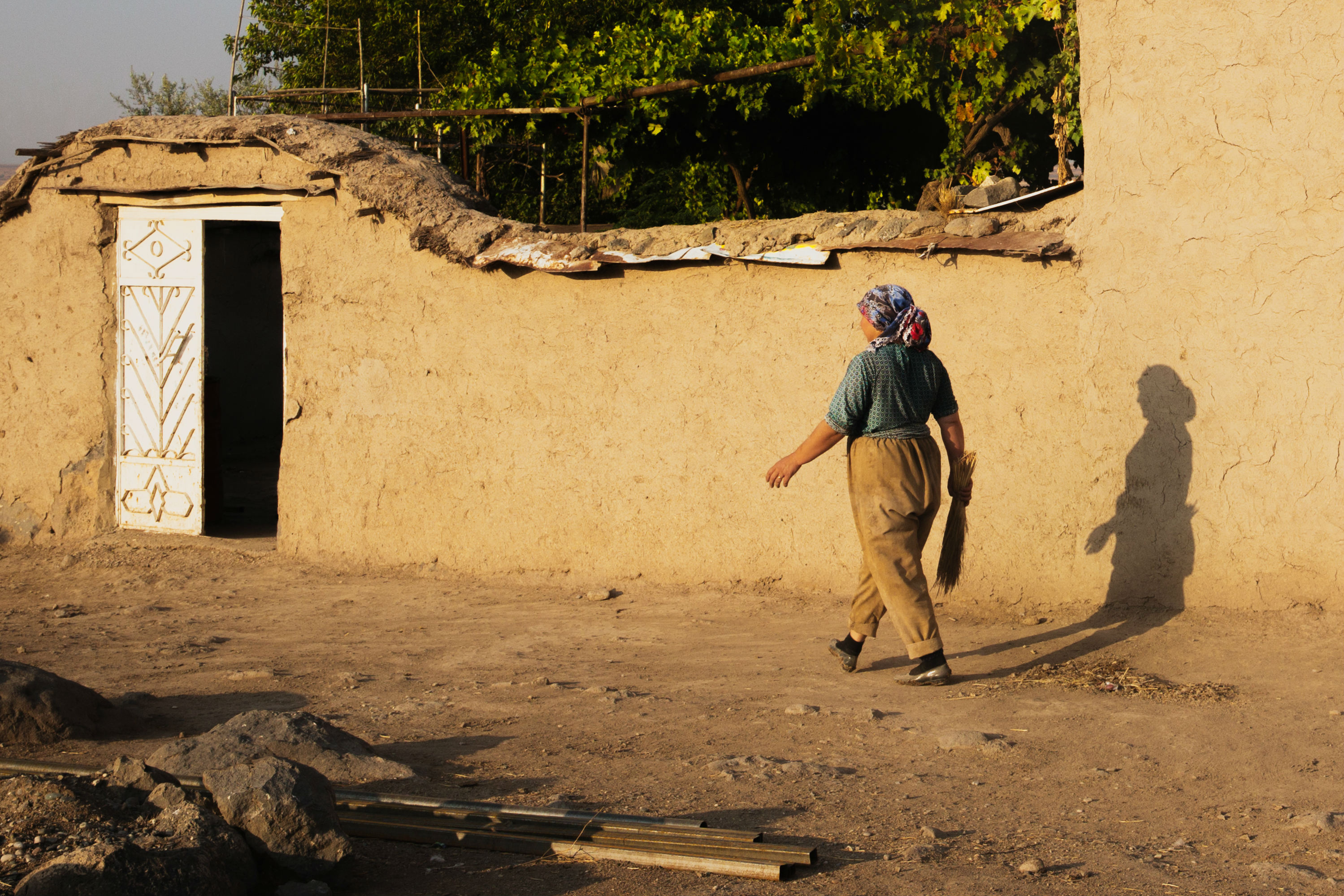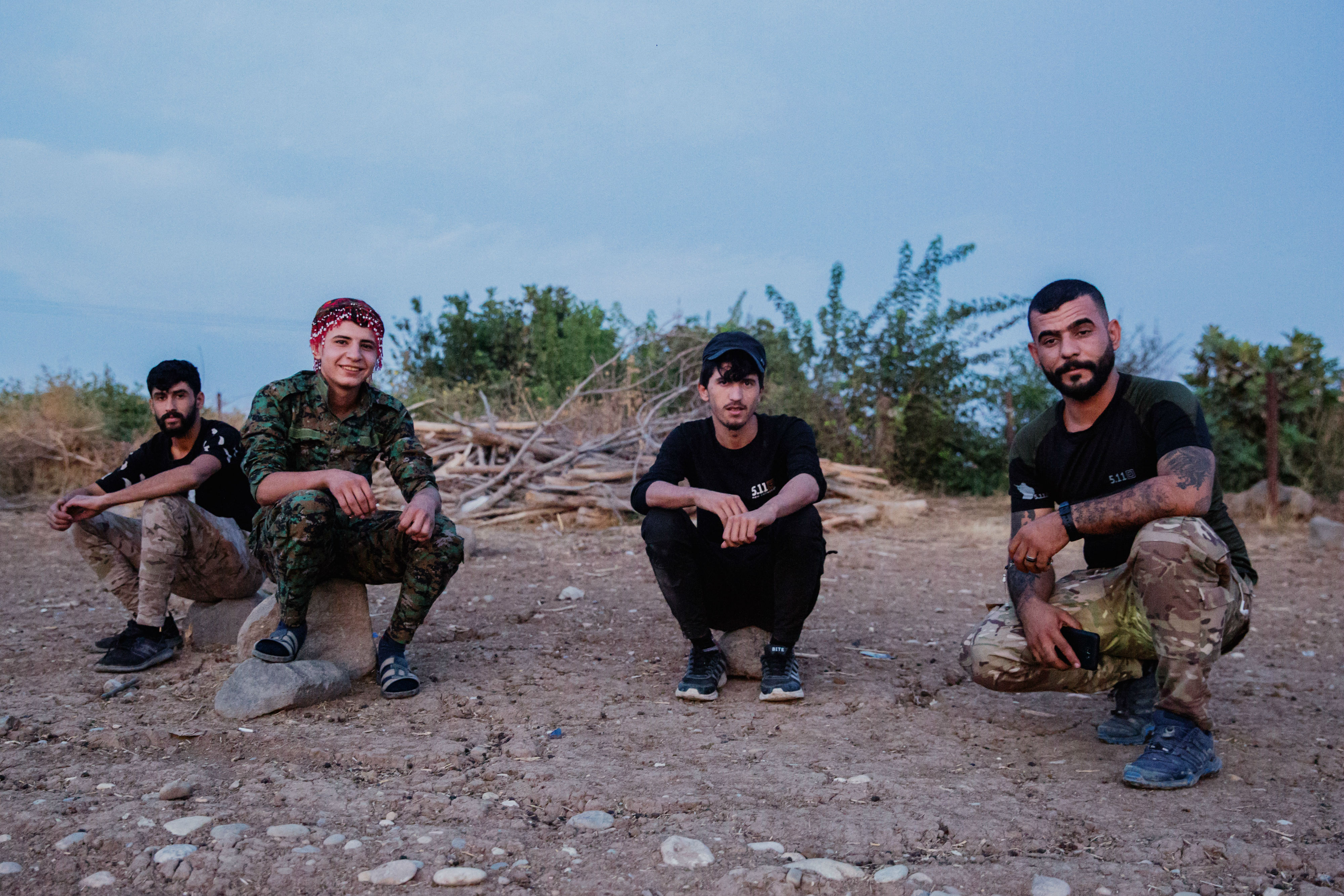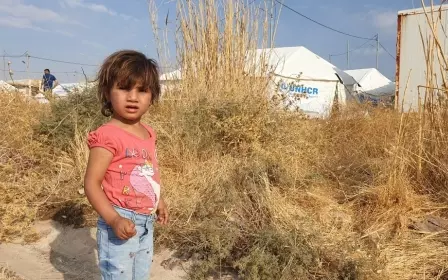On the Turkish-Syrian border, a Kurdish commune waits nervously

The bumpy, country road to Jarudiyah shouldn’t be tense, but it is. From the dirt track a village, Kebeli, can be seen on the Turkish side of the border where a military outpost is positioned.
“We are at range of their mortar bombs and even light weapons,” a passenger in the car says.
Jarudiyah is a little hamlet sheltering about 1,500 inhabitants. It was one of the first places to be shelled at the beginning of the Turkish offensive dubbed Operation Spring of Peace, which was launched on 9 October.
Though an early target, Jarudiyah is currently free of fire. At Washington’s behest, Turkey agreed on Friday to halt its offensive and allow Kurdish fighters to withdraw.
The ceasefire is set to end at 10pm on Tuesday, and in the village the silence is deafening in most parts, except in a small courtyard where a dozen children’s laughter fill the air as they play around. Not more than ten years old, these kids carry sticks with straps and are playing soldier.
Stay informed with MEE's newsletters
Sign up to get the latest alerts, insights and analysis, starting with Turkey Unpacked
Spared violence, till now
Outside the school, shrapnel is still all over the ground. The first Turkish shells to hit the region around the Syrian town of al-Malikiya (Derik in Kurdish) landed here, in the first hours of the operation.
“As a matter of fact, it’s the first attack on the village since the beginning of the Syrian revolution. Our region had been well spared from violence,” says Hevrin, a Kurd native to Iran now living in the village.
Jarudiyah seems to be living in a vacuum. Self-governance is the norm, explains Hayat, a local member of the village.
She is one of the most active members of the various local self-governance committees set up here.
'It’s the first attack on the village since the beginning of the Syrian revolution'
- Hevrin, Iranian Kurd
Their responsibilities include rubbish collection, tending of green spaces, communal agriculture and justice. Jarudiyah has a reputation around the Derik region for being one of the more successful communes.
Like other Kurdish communities in northeastern Syria, Jarudiyah was established on a model championed by Abdullah Ocalan, the leader of the outlawed Kurdistan Workers’ Party (PKK) militant group, which has waged a deadly, decades-long insurgency against the Turkish state.
On the side of the village school, an Ocalan quote reads: “Your water, your land, you must give it back to the commune and live a free and democratic life.”
Some 40,000 people have been killed in fighting and attacks since the PKK insurgency began in the 1980s in pursuit of an independent Kurdish state. Ankara sees the Syrian Kurds that hold northeast Syria as an extension of the group.
Turkey launched its offensive a fortnight ago with the stated aim of pushing Syrian Kurdish fighters at least 35km from the border, though it is widely understood that Ankara’s main aim is to ensure that no Kurdish state could be established on its border.
Facing the threat
In Jarudiyah, as elsewhere, the Turkish offensive comes as no surprise. They were all preparing for it. But for the inhabitants of this sleepy hamlet, the threat is visible, a few hundred meters away, at most.
“We are completely helpless in front of aerial strikes such as the ones that already hit the village,” resident Mohamad Khalil says, adding that preparations are being made to confront any invasion nonetheless.
“Some of the village’s forces are ready to respond and the surveillance committee is operational day and night.”
'It’s not perfect, but we are trying our best to make everyone as happy as possible. The arrival of the Turks will destroy all of this'
- Hayat, Jarudiyah resident
Like many Kurds of the region, Khalil, a man in his 50s, displays the portrait of his son who fell in one of the various battles fought by the People’s Protection Units (YPG) militia.
The YPG is a leading component in the Syrian Democratic Forces, a US-backed group that was the principal combatant in the fight against the Islamic State group (IS) in Syria.
Kurds will “never bow down, they will never be removed from their land”, Khalil exclaims. “There is no freedom without sacrifices.”
Next to him, Hevrin evaluates the situation in a more pessimistic manner.
The United States has withdrawn its forces from the area, leaving the Kurds exposed, and he believes nothing can stop them from being forced from the area.
“Our bad luck is that we don’t have any mountains here in Syria,” he adds bitterly, referring to an old Kurdish saying that they have no friends but the mountains.
What future ?
It’s a very dark night in Jarudiyah. Turkish drones are buzzing in the air.
In a house, about 15 men and women gather, sitting on mattresses. Despite the grim circumstances, they try their best to stay optimistic. Hevrin chats with a former member of the Women’s Protection Unit (YPJ) militia, who lost her legs in a Turkish air strike on Mount Qarachokh in Iraq in 2017.
Hours from the end of the ceasefire, residents are trying their best to enjoy the fragile peace.
But they aren’t fooled by the apparent silence, they know that everything could change at a moment, in a deafening sound of explosions.
“Here, we’ve built a different life. It’s not perfect, but we are trying our best to make everyone as happy as possible. The arrival of the Turks will destroy all of this,” says Hayat, one of those present.
All of the Kurds here are also actively keeping track of the news from the front.
The TV plays non-stop news, while a macabre video purportedly showing a YPG fighter being beheaded is passed around on a phone. Turkey’s Syrian rebel allies have been accused of several atrocities since the operation began.
“These beasts... It’s as if IS was getting its payback from Raqqa and Deir Ezzor, but this time with Turkish armament and global consent,” says one Kurd as the video is viewed.
Jarudiyah’s geographic setting makes it a vulnerable target. Not only to Turkish bombings, but also to a ground invasion.
“Turkey has enough weapons to commit a massacre, but it will never be able to turn this operation in a political victory. The whole world is watching and knows,” Hevrin says.
At dawn, the trails of Turkish jets coming and going in the sky is silhouetted in the otherwise clear sky.
Surveillance is intense as the ceasefire’s deadline ends. Despite this fateful hours nearing, children are going to school as if certain nothing will happen. Teachers are waiting for them in the courtyard.
A mortar bomb had fallen a few meters from it days before, but the local council decided to maintain the classes until the last moment.
Unconscious of the danger lurking not far away, children giggle in their courtyard before stepping in their classroom to sit on their worn-out desks.
Middle East Eye delivers independent and unrivalled coverage and analysis of the Middle East, North Africa and beyond. To learn more about republishing this content and the associated fees, please fill out this form. More about MEE can be found here.







